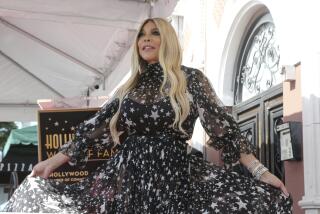Wildmon Fails in Bid to Thwart Film : Lawsuit: A federal judge’s ruling will allow U.S. screenings of ‘Damned in the U.S.A.,’ a British documentary on censorship battles.
- Share via
A federal judge in Aberdeen, Miss., ruled late Tuesday against the Rev. Donald Wildmon and his efforts to halt U.S. theatrical and television release of “Damned in the U.S.A.,” a British documentary on recent American censorship battles.
Judge Glenn Davidson rejected Wildmon’s claim that the filmmakers violated his contract with them. Davidson noted that the contract between Wildmon and the filmmakers did not give Wildmon “control over the distribution of the entire film” and that “any objective person who views the film would believe that Wildmon is projected fairly and intelligently.”
Producers Paul Yule and Jonathan Stack are now free to proceed with plans to have “Damned in the U.S.A.” released theatrically, with subsequent television airings possibly in 1993. In addition, the British Academy of Film and Television/Los Angeles and the Directors Guild of America will present an Oct. 15 screening of the film at the guild’s theater in Los Angeles.
Yule, contacted by phone Wednesday in London, said that he was delighted with Davidson’s decision, adding that “it’s been a very long struggle to get the film shown in America, and it just goes to show that Wildmon’s type of intimidation doesn’t work. I hope that maybe the tide (for censorship) has turned.”
“We’re quite surprised with the ruling,” responded Benjamin Bull, the attorney representing Wildmon and his American Family Assn. Bull said that he intends to “immediately” appeal the decision.
Yule and Stack’s attorney, Martin Garbus, expressed confidence that Wildmon’s appeal would fail.
The film explores the censorship battles surrounding federal money for such artists supported by the National Endowment for the Arts as the late Robert Mapplethorpe and Andres Serrano. Both Wildmon--arguing on camera that there should be no public funding for art including explicit sexual imagery--and the artworks themselves are shown.
Wildmon agreed to be filmed after Yule and Stack signed a Dec. 4, 1990, contract restricting use of the filmed interview only as part of the film, and not for “unauthorized” media uses such as sexually oriented publications.
Yule and Wildmon corresponded until the spring of 1991, when Wildmon viewed “Damned in the U.S.A..” He then notified Yule that, based on his understanding of the contract, he would not grant permission “for the film to be shown in the United States.” A September, 1991, screening of “Damned” at the Margaret Mead Film Festival triggered Wildmon’s lawsuit for breach of contract.
The filmmakers’ countersuit in New York for $3 million in damages was postponed until the Mississippi hearing concluded. Now that Wildmon’s claim of contract violation has been rejected, the New York case is expected to proceed.
“A decision on that,” said Garbus, “will take some time. The urgent matter is behind us, which is to legally free the film so the public may view it.”
But Bull said that he plans to claim that the judge “erroneously accepted (the filmmakers’) false explanations, including the one that they didn’t understand the contract they signed with Rev. Wildmon.”
“Damned in the U.S.A.” was screened at a film festival in Los Angeles last June. The organizers said at the time that they believed Wildmon’s lawsuit would not encompass their event because it did not qualify as commercial use of the documentary.
More to Read
Only good movies
Get the Indie Focus newsletter, Mark Olsen's weekly guide to the world of cinema.
You may occasionally receive promotional content from the Los Angeles Times.








